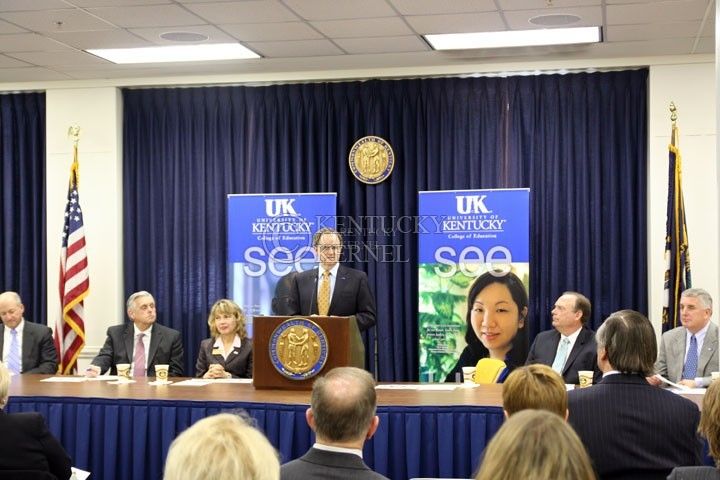Ky. lab to bridge technology gap
February 3, 2010
By Hope Smith
Video games may show UK the way to its top-20 spot.
UK College of Education Dean Mary John O’Hair introduced the Kentucky P20 Innovation Lab plan Tuesday morning in Frankfort alongside UK President Lee Todd and other Kentucky education leaders.
The P20 Innovation Lab will bring together individuals throughout the community to improve classroom learning environments in new ways with the hope of preparing students for higher education and for future careers more adequately.
“It’s all about innovation,” Todd said. “And this is the right time to talk about this here at UK.”
Educators around the country have realized children today are growing up in a digital age, but many classrooms do not cater to students with new technology.
The P20 Innovation Lab is one way to introduce new methods of teaching and learning to Kentucky schools, starting at the preschool level and continuing through college.
“We need to bridge the gap between digital natives and digital immigrants,” O’Hair said.
O’Hair is referring to those who grew up with todays technology and those who are just now learning how to “tweet” and “skype.”
“We want to look at digital, game-based learning, physical activity and wellness,” O’Hair said. “We need to build the leadership capacity to support and sustain innovation in schools.”
The program will host studies and promote change in Kentucky’s schools to accommodate all levels of learning, including examination and improvement of how the future teachers of the country themselves are taught. It calls for a transformation in the way we look at research, teaching and service, O’Hair said.
“The classroom of the 21st century has to have an innovative teacher,” said Phillip Rogers, executive director of the Education Professional Standards Board. “We need an army of teachers that can teach every student.”
The P20 Innovation Lab will partner with Kentucky schools, businesses and government to make these necessary changes and continue to make room for the evolution of new teaching methods that will keep students raised in this digital era engaged.
While yearly state-standardized testing measures the educational capabilities of students, the average ACT score of a school’s incoming freshman class cannot solely measure the level of success, Todd said.
“That’s not what makes a flagship institution,” he said. “We need to increase (test scores) across the state.”
Instead of changing learning environments and education programs gradually over many years, the P20 Innovation Lab strives to make changes more quickly and efficiently after research determines what works best.
“We cannot reach the goals and needs of students … by making decisions every decade,” Rogers said. “We need to make these decisions daily.”
The program is based on the University of Oklahoma’s K20 Center, which was previously under O’Hair’s leadership. It will receive $1.5 million in funding from UK over the next three years. Students involved in the program can receive college scholarships and will continue to help with the program throughout their college career no matter what major they choose, making the P20 Innovation Lab a full-circle process.
“Why do we use the word ‘lab’?” O’Hair said. “Because this is a place to come together and turn ideas into concrete practices.”
































































































































































